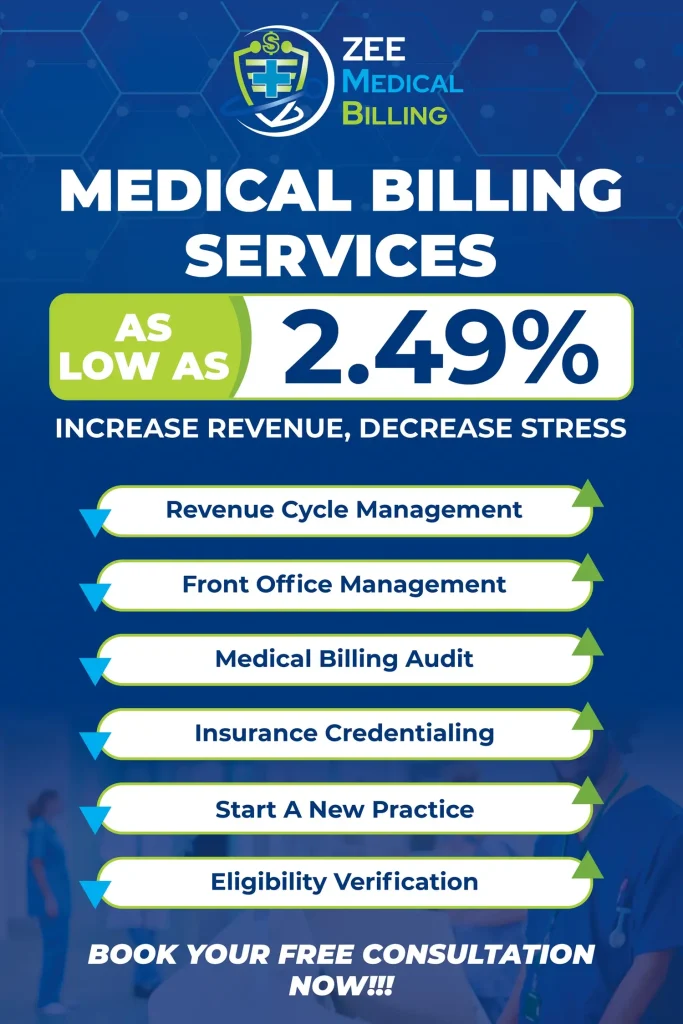Cardiology practices face some of the highest denial rates in healthcare, with complex procedures, expensive equipment, and stringent insurance requirements creating a perfect storm of billing challenges. When claims are denied, revenue gets trapped in accounts receivable, cash flow suffers, and staff waste valuable time fighting with insurance companies instead of supporting patient care. That’s why implementing an effective cardiology medical billing solution specifically designed to resolve denials becomes essential for practice financial health.
Understanding Cardiology Billing Denials
Why Cardiology Faces High Denial Rates
Cardiology isn’t just another medical specialty when it comes to billing complexity. The field combines high-cost procedures, sophisticated diagnostic testing, and life-saving interventions that insurance companies scrutinize intensely. Several factors contribute to elevated denial rates:
Procedure Complexity: Cardiac catheterizations, ablations, pacemaker implantations, and cardiovascular surgeries involve multiple components, each requiring precise coding. A single procedure might require six or more CPT codes with specific modifiers, and mistakes anywhere in this chain trigger denials.
High Dollar Amounts: Cardiology procedures often cost tens of thousands of dollars. Insurance companies review expensive claims more aggressively, looking for any reason to deny or reduce payment.
Medical Necessity Scrutiny: Payers question whether cardiac procedures are medically necessary more frequently than routine medical services. They demand extensive documentation justifying interventions, particularly for diagnostic testing like stress tests and echocardiograms.
Authorization Requirements: Most cardiac procedures require prior authorization, and obtaining approvals involves navigating complex insurance protocols. Missing or incomplete authorizations result in automatic denials regardless of medical necessity.
Multiple Providers: Cardiac care often involves multiple physicians (interventional cardiologist, electrophysiologist, cardiovascular surgeon) billing for the same episode of care. Coordination of benefits and appropriate modifier usage become critical to avoid duplicate billing denials.
The Financial Impact of Denials
Denials don’t just delay payment, they fundamentally damage practice finances. Consider the true cost:
Lost Revenue: Denied claims that aren’t successfully appealed represent permanent revenue loss. Industry studies suggest 60-65% of denied claims are never resubmitted, meaning that revenue simply disappears.
Administrative Costs: Working denials requires significant staff time. Each denied claim needs investigation, correction, and resubmission, consuming hours that could be spent on productive activities.
Cash Flow Disruption: Denials create unpredictable revenue, making it difficult to budget for expenses, invest in equipment, or hire staff. Practices struggle to meet payroll and pay vendors when too much revenue sits in denied claims.
Patient Relationship Damage: When insurance denies coverage, patients often receive unexpected bills that damage their trust and satisfaction. They may leave negative reviews or switch to other practices.
For cardiology practices operating on thin margins, denial rates above 10-15% can mean the difference between profitability and financial struggle.
Common Denial Reasons in Cardiology Billing
Medical Necessity Denials
Insurance companies frequently deny cardiac procedures claiming they weren’t medically necessary. This denial reason appears particularly often for:
Diagnostic Testing: Stress tests, echocardiograms, cardiac CT scans, and nuclear imaging when payers claim insufficient symptoms or risk factors justify testing
Interventional Procedures: Cardiac catheterizations, angioplasties, and stent placements when documentation doesn’t clearly establish blockage severity or symptom correlation
Device Implantations: Pacemakers and defibrillators when ejection fraction or arrhythmia documentation doesn’t meet specific criteria
Repeat Procedures: Follow-up testing or interventions when payers claim insufficient time has passed since previous procedures
Documentation Requirements for Cardiac Procedures
Overcoming medical necessity denials requires documentation that clearly establishes:
- Symptoms: Specific patient complaints (chest pain, shortness of breath, syncope) with severity and frequency
- Objective Findings: EKG abnormalities, stress test results, imaging findings, lab values supporting diagnosis
- Failed Conservative Treatment: Documentation of medication trials and lifestyle modifications before invasive interventions
- Clinical Criteria: Meeting specific payer criteria (ejection fraction thresholds, blockage percentages, arrhythmia frequency)
- Clinical Decision Making: Physician reasoning explaining why the procedure is appropriate for this specific patient
Without this comprehensive documentation, even clearly appropriate procedures get denied.
Prior Authorization Issues
Authorization denials occur when:
- Authorization wasn’t obtained before the procedure
- Authorization was obtained but expired before the procedure date
- The procedure performed differs from what was authorized
- Authorization was obtained under incorrect insurance information
- Documentation supporting authorization wasn’t submitted completely
Authorization requirements vary by payer and procedure type. Some require authorization for diagnostic testing; others only for interventional procedures. Tracking these requirements across multiple insurance companies overwhelms practices without systematic processes.
Coding Errors Specific to Cardiology
Cardiology coding is notoriously complex, with numerous opportunities for errors:
Bundling Violations: Billing components separately that should be reported together under a single comprehensive code
Unbundling Errors: Using multiple codes when a single comprehensive code is appropriate
Modifier Mistakes: Missing required modifiers (59, 25, RT, LT) or using inappropriate modifiers
Global Period Issues: Billing for services included in the global surgical period
Incorrect Code Selection: Choosing codes that don’t accurately describe the procedure performed
ICD-10 Specificity: Using diagnosis codes that lack required specificity (acute vs. chronic, location, laterality)
Each coding error creates denial risk. Professional cardiology medical billing solutions employ certified coders with specialty-specific expertise who understand these nuances intimately.
Timely Filing and Coordination of Benefits
Administrative denials occur when claims aren’t filed within payer deadlines (typically 90-180 days) or when coordination of benefits isn’t handled correctly. For cardiology patients with Medicare plus supplemental insurance, proper sequencing becomes critical, primary insurance must be billed first, then secondary, with appropriate coordination of benefits information.
What Makes an Effective Cardiology Medical Billing Solution
Specialty-Specific Expertise
Generic medical billing knowledge doesn’t translate effectively to cardiology. Effective cardiology medical billing solutions require:
- Deep understanding of cardiac procedure coding
- Knowledge of cardiology-specific payer policies
- Experience with cardiac documentation requirements
- Familiarity with cardiac medical necessity criteria
- Relationships with cardiology payer representatives
This expertise comes from years of focused cardiology billing experience, not from servicing one or two cardiology practices among hundreds of general medicine clients.
ZEE Medical Billing provides specialized cardiology billing services with deep expertise in the unique challenges cardiology practices face.
Comprehensive Denial Management Process
Effective denial resolution requires systematic processes:
Immediate Denial Identification: Automated systems flag denials as soon as remittance advice is received
Root Cause Analysis: Investigation determining why the denial occurred
Prioritization: Focus on high-dollar denials with strong appeal probability
Timely Appeals: Submission within payer deadlines with complete supporting documentation
Escalation Procedures: Processes for handling denied appeals through higher review levels
Trend Analysis: Identification of patterns requiring process changes
Without this systematic approach, denials pile up unworked, and revenue remains uncollected indefinitely.
Technology Integration
Modern cardiology medical billing solutions leverage technology to prevent and resolve denials:
- Integration with cardiology EHR systems for seamless data flow
- Automated eligibility verification catching coverage issues before service
- Real-time authorization tracking preventing authorization-related denials
- Claim scrubbing identifying errors before submission
- Automated denial workflow routing denials to appropriate staff
- Reporting dashboards providing visibility into denial metrics
Technology doesn’t replace human expertise, it amplifies it, enabling billing specialists to work more efficiently and effectively.
Prevention Strategies in Cardiology Medical Billing Solutions
Proactive Authorization Management
Rather than reactive authorization approaches that obtain approvals just before procedures, proactive management:
- Identifies authorization requirements at scheduling
- Submits authorization requests with complete clinical information
- Follows up systematically on pending authorizations
- Tracks authorization expiration dates
- Communicates authorization status to clinical staff
- Documents authorization numbers for claim submission
This proactive approach prevents authorization denials before they occur.
Real-Time Eligibility Verification
Verifying insurance eligibility in real-time before services catches:
- Coverage terminations or plan changes
- Incorrect insurance information
- Coverage limitations or exclusions
- Coordination of benefits requirements
- Patient financial responsibility amounts
Early identification enables financial counseling with patients before procedures, preventing billing surprises and collection difficulties.
Clinical Documentation Improvement
Linking Documentation to Medical Necessity
Many denials stem from adequate clinical care with inadequate documentation. Clinical documentation improvement programs train physicians to document:
- Specific symptoms with severity quantification
- Objective test results supporting diagnosis
- Clinical reasoning explaining procedure necessity
- Failed conservative treatments before interventions
- Specific criteria justifying device implantations
This documentation serves dual purposes, supporting quality clinical care while providing the evidence payers require for claim approval. Resources like the Cardiology Medical Billing Services 101 guide offer detailed documentation best practices.
Advanced Coding Solutions for Cardiology
Understanding Cardiology CPT Codes
Cardiology involves hundreds of CPT codes across multiple categories:
Diagnostic Testing: 93000-93799 (cardiovascular services) Cardiac Catheterization: 93451-93533 Electrophysiology: 93600-93662 Pacemaker/ICD Services: 33206-33273 Vascular Interventions: 37220-37239 Cardiovascular Surgery: 33010-37799
Each code has specific documentation requirements, bundling rules, and modifier requirements. Professional coders maintain current knowledge of these requirements and apply them consistently.
Modifier Usage and Bundling Rules
Modifiers communicate specific circumstances affecting reimbursement:
Modifier 59: Distinct procedural service (unbundling when appropriate) Modifier 25: Significant, separately identifiable E/M service Modifier 26: Professional component only Modifier TC: Technical component only Modifiers RT/LT: Right or left side designation
Incorrect modifier usage triggers denials for bundling violations or missing required information. National Correct Coding Initiative (NCCI) edits establish which codes can be billed together and which modifiers override edits. Professional billing solutions maintain current knowledge of these complex rules.
Global Period Management
Surgical procedures include global periods (10 or 90 days) during which related services are included in the surgical payment. Billing separately for services within global periods triggers denials unless appropriate modifiers justify separate payment. Understanding which services are included versus separately billable requires detailed knowledge of global surgical packages.
The Denial Resolution Process
Identifying Root Causes
When denials occur, identifying root causes enables both individual claim resolution and process improvements preventing recurrence:
Is this a temporary issue (incorrect patient information, missing authorization) or systematic problem (consistent medical necessity denials for specific procedures)?
Does the denial reflect a legitimate concern requiring clinical information, or administrative error by the payer?
What specific documentation or information would support appeal success?
Root cause analysis transforms individual denied claims into learning opportunities that improve overall billing performance.
Building Strong Appeals
Successful appeals require:
Clear Cover Letter: Concise explanation of why the denial is incorrect
Clinical Documentation: Complete medical records supporting medical necessity
Policy Citations: Reference to specific payer policies supporting coverage
Medical Literature: Studies supporting procedure appropriateness when relevant
Provider Letter: Physician statement explaining clinical reasoning
Comparison Data: Evidence of inconsistent application of policies when appropriate
Generic appeals rarely succeed. Compelling, specific appeals with complete supporting documentation dramatically increase overturn rates.
Payer-Specific Appeal Strategies
Each payer has distinct appeal procedures, timelines, and success factors. Effective cardiology medical billing solutions maintain payer-specific knowledge:
- Which payers respond best to clinical literature citations
- Which review levels typically overturn specific denial types
- Which payer representatives are most responsive
- What documentation format each payer prefers
- What timelines each payer follows for appeal decisions
This institutional knowledge improves appeal efficiency and success rates significantly.
Technology Solutions That Reduce Denials
Automated Scrubbing Tools
Claim scrubbing software identifies errors before submission:
- Missing or invalid diagnosis codes
- Bundling violations flagged by NCCI edits
- Missing required modifiers
- Incorrect place of service
- Missing authorization numbers
- Patient demographic errors
Automated scrubbing catches errors that would otherwise trigger denials, improving clean claim rates and accelerating payment.
Predictive Analytics
Advanced analytics identify patterns predicting denial risk:
- Which procedure types experience highest denial rates
- Which payers deny most frequently for specific services
- Which physicians have higher denial rates requiring education
- Which diagnosis codes trigger medical necessity reviews
- What documentation elements correlate with approval versus denial
Predictive insights enable proactive interventions preventing denials before they occur.
Integration with EHR Systems
Seamless integration between EHR and billing systems eliminates manual data entry errors and ensures complete information transfer:
- Demographics automatically populate billing records
- Clinical documentation flows directly to billing
- Procedure information transfers accurately
- Authorization tracking links to scheduled procedures
- Documentation completion alerts notify of missing records
Integration reduces errors while improving efficiency significantly.
Measuring Success in Denial Resolution
Key Performance Indicators
Effective cardiology medical billing solutions track specific metrics:
Denial Rate: Percentage of submitted claims denied (target: below 5-10%)
Denial Overturn Rate: Percentage of appeals resulting in payment (target: above 60-70%)
Days to Appeal: Average time from denial to appeal submission (target: within 15 days)
Denial Aging: How long denied claims sit unworked (target: minimal aging beyond 30 days)
Denial Value: Dollar amount in denied claims (target: below 5% of monthly charges)
Root Cause Categories: Distribution of denial reasons identifying systematic issues
Tracking Denial Trends Over Time
Monthly trending reveals whether denial management efforts are working:
- Is overall denial rate decreasing?
- Are specific denial types being eliminated?
- Is appeal success rate improving?
- Are high-dollar denials being resolved faster?
- Is aged denial inventory decreasing?
Positive trends validate current strategies; negative trends signal need for process adjustments.
Choosing a Cardiology Medical Billing Solution
Essential Features to Look For
When evaluating cardiology medical billing solutions, prioritize:
Cardiology Expertise: Demonstrated experience with cardiology practices specifically
Certified Coders: Staff holding cardiology coding certifications (CCC)
Denial Management: Systematic processes for prevention and resolution
Technology Platform: Advanced systems with cardiology-specific features
Transparent Reporting: Detailed metrics showing denial performance
Authorization Management: Comprehensive tracking and obtaining
Proven Results: References demonstrating denial reduction and revenue improvement
Questions to Ask Potential Partners
- How many cardiology practices do you currently serve?
- What percentage of your coders hold cardiology-specific certifications?
- What’s your average denial rate for cardiology practices?
- What’s your appeal success rate for cardiology claims?
- How do you stay current with cardiology coding and payer policy changes?
- What technology do you use for claim scrubbing and denial management?
- Can you provide references from cardiology practices similar to ours?
- How do you handle authorization management?
- What reporting will we receive about denial performance?
- What’s your process when denials aren’t overturned on first appeal?
Responses reveal whether potential partners truly understand cardiology billing or are simply claiming expertise to win business.
ZEE Medical Billing’s Cardiology Expertise
ZEE Medical Billing provides comprehensive cardiology billing services specifically designed to resolve denials and optimize revenue.
Their cardiology medical billing solution includes:
Specialized Expertise: Team experienced exclusively with cardiology billing complexities
Certified Coders: Staff holding cardiology-specific coding certifications
Comprehensive Denial Management: Systematic prevention and resolution processes
Advanced Technology: Integrated systems with cardiology-specific features
Proven Results: Track record of reducing denials and increasing collections for cardiology practices
Transparent Communication: Detailed reporting and accessible support
Resources including their Cardiology Medical Billing Services 101 and comprehensive Cardiology Medical Billing Services Guide demonstrate their commitment to cardiology practice success.
Conclusion
Cardiology practices face unique denial challenges stemming from procedure complexity, high costs, stringent medical necessity requirements, and intricate coding rules. Without an effective cardiology medical billing solution, denials devastate cash flow and trap revenue in accounts receivable indefinitely.
Comprehensive solutions combine specialty-specific expertise, systematic denial management processes, advanced technology, and proactive prevention strategies. They don’t just react to denials, they implement processes that prevent denials before they occur while systematically resolving those that do happen.
ZEE Medical Billing exemplifies this comprehensive approach through specialized cardiology billing services that transform denial management from constant frustration to systematic process delivering measurable financial results.
Your expertise lies in caring for hearts and saving lives. Let cardiology billing specialists handle the denial resolution so you can focus entirely on patient care.
FAQs
1. What’s the average denial rate for cardiology practices?
Cardiology practices typically experience denial rates of 10-20%, significantly higher than the 5-10% average across all medical specialties. This elevated rate stems from procedure complexity, high costs triggering scrutiny, stringent medical necessity requirements, and intricate coding rules. With effective denial management processes, cardiology practices can reduce denial rates to 5-10% or lower through prevention strategies and systematic resolution.
2. How long does it typically take to overturn a denied cardiology claim?
Initial appeal responses typically arrive within 30-60 days of submission, though timelines vary by payer. If initial appeals are denied, second-level appeals may take an additional 30-60 days. Complex cases requiring peer-to-peer reviews or external review can extend to 90-120 days or longer. Professional billing services expedite the process through complete initial submissions and established payer relationships, often achieving faster resolution than practices handle internally.
3. What documentation is most critical for appealing medical necessity denials in cardiology?
Critical documentation includes detailed clinical notes explaining symptoms and their severity, objective test results (EKG, stress test, echocardiogram, catheterization findings), documentation of failed conservative treatments before interventions, specific measurements meeting clinical criteria (ejection fraction, blockage percentages), and physician letters explaining clinical reasoning. Medical literature supporting procedure appropriateness strengthens appeals. Complete, specific documentation dramatically improves overturn success compared to generic appeals.
4. Can coding errors lead to permanent revenue loss in cardiology?
Yes, certain coding errors create permanent revenue loss. Undercoding (using codes with lower reimbursement than justified) results in receiving less payment than earned, and once claims are paid, retrospective correction is difficult. Claims denied for bundling violations or global period issues are often not reimbursable even with appeals. Timely filing denials typically can’t be overturned. Professional coding prevents these permanent losses by ensuring accurate initial submission.
5. How do cardiology medical billing solutions stay current with constantly changing coding and payer policies?
Professional solutions maintain currency through multiple channels: regular training and certification for coding staff, subscriptions to coding update services, participation in cardiology billing associations and forums, monitoring payer policy bulletins and updates, attendance at cardiology coding seminars and webinars, and systematic tracking of denials revealing new payer requirements. This ongoing education ensures practices benefit from current knowledge rather than discovering policy changes through claim denials.
Follow Us
- Instagram: @zee_medical_billing
- Facebook: ZeeMedicalBilling
- YouTube: Zee Medical Billing Channel
- Twitter/X: @BillingZee
- LinkedIn: Zee Medical Billing Company









